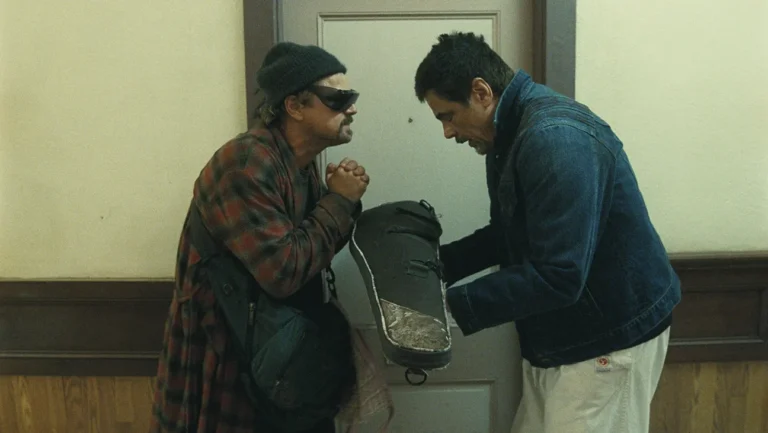Admit it. Background work has a stigma. For many actors, it’s the dusty waiting room of the acting world. It’s the gig you take when you’re just starting out, or when bills are due and your agent’s phone is suspiciously silent. It’s the role your Aunt Linda hears about and says, “So … you’re not really acting?”
Here’s the truth: it’s like a paid internship. You get to watch professional actors hit their marks, listen to seasoned directors call the shots and see the dance between lighting and camera.
Everyone’s goals are different. Some actors prefer to remain in the background, either as a side hustle or simply for enjoyment, while others use it as a stepping stone.
No matter what your goal is, you’re getting paid to learn. If you treat the job with respect and curiosity, you can transform your time in the background into an invaluable on-set education.
Let’s find out how to make this happen.
What You’ll Find in This Article
- Shift Your Mindset From “Filler” to “Field Study”
- Learn the Unspoken Rules of Set Etiquette
- Treat Every Set as a Master Class in Blocking
- Build Camera Awareness Without the Pressure
- Observe Professional Actors in Their Natural Habitat
- Network Without Being “That Actor”
- Study the Crew — They’re Your Future Teammates
- Build the Quiet Skills: Stamina and Patience
- Turn Your Days Into a Personal Film School
- Use Your Experience to Level Up
Shift Your Mindset From “Filler” to “Field Study”
The first step to turning background work into career fuel is mental. Many actors dismiss extra work as “not real acting” because it doesn’t involve dialogue or a close-up. But if you reframe it as “paid research,” you’ll start to notice how much you can absorb.
When you’re on set, you’re essentially in the world’s best laboratory for studying:
- Blocking: How leading actors are placed, why certain moves are chosen, and how those choices affect the shot.
- Continuity: How props, positions, and movements stay consistent from one take to the next.
- Energy Management: How actors conserve their focus between takes and ramp it up when “Action!” is called.
- Professionalism: How crew and cast maintain pace and solve problems without melting down (usually).
The difference between just “standing there” and learning is intention. Show up with the curiosity of a film student and the discipline of a working professional.
Pro Tip: Before stepping onto set, jot down three things you want to observe that day—perhaps it’s how a specific actor quickly finds their emotional state, or how the director gives notes. That way, you’re training yourself to see patterns.
Learn the Unspoken Rules of Set Etiquette
Background work is an etiquette boot camp, and how you behave on set matters. The industry is smaller than you think, and reputations travel quickly.
Here are basic rules you should follow:
- Be Early: Arriving 10-15 minutes before call time is a good idea. If you arrive even sooner, consider staying nearby or ducking into a nearby coffee shop.
- Wardrobe Preparedness: If asked to bring your own wardrobe, ensure it is clean and within the given guidelines (usually no logos or specific colors). Having a small rolling suitcase helps.
- Silence Means Silence: If you’re in a scene, your “background chatter” is pantomimed, not actual talking, unless directed otherwise. Don’t overdo your actions. Just talk without sound.
- Respect the Chain of Command: If you have a question, go to the background Production Assistant or wrangler, not the director or lead actors.
- No Phones Out on Set: Even if you see others sneaking photos, resist. It’s a fast way to get blacklisted.
By mastering etiquette now, you’re laying the foundation for being a lead who’s loved by crew and cast alike later.
On-Set Example: During a TV drama shoot, a background actor was promoted to a featured extra for consistently staying on his mark, remaining attentive, and never slowing down the set. The AD knew his name by the end of the day. So when a small, non-speaking “bartender” role opened, guess who got it?
Treat Every Set as a Master Class in Blocking
Knowing where to stand, when to move, and how to hit your mark without looking down is a skill every actor should possess.
How to Study Blocking While Doing Background Work:
- Watch Rehearsals: Pay attention to how principal actors adjust their positions for the camera — sometimes it’s not about realism, but about what works visually.
- Note the Camera Setups: The placement of the camera often dictates actor movement. Learn to anticipate adjustments when the camera moves.
- Practice Precision: When you’re told to “cross from the bar to the door on cue,” treat it as if it’s your close-up. Land on the exact mark, every time.
Pro Tip: If you see tape marks on the floor, study their placement. Understanding why they’re there will make you faster at hitting yours when the time comes.
Build Camera Awareness Without the Pressure
Being comfortable on camera isn’t just about remembering lines—it’s about knowing where the camera is, what lens it’s using, and how your movements read. Background work lets you practice all this without the career stakes of a starring role.
Things to Notice:
- Framing: Are you in the shot or just providing depth? Knowing this helps you gauge how big or subtle your movements should be.
- Eye Lines: Where are the actors looking, and why? This helps you avoid “eyeline drift,” a subtle mistake that can ruin continuity.
- Cheating for the Camera: Notice when actors angle themselves unnaturally to make themselves more visible to the camera. This skill will save your performances later.
On-Set Example: During a restaurant scene, a New York City background actor named Abby Collins was instructed to enjoy dinner with her scene partner. During a take, another actor — a lead in the show — walked by and gave her a sudden, hostile glare. Initially confused, Abby later realized she wasn’t just “background filler.” The director had deliberately used her to generate a strong, meaningful reaction from the lead. Sometimes being an extra is more valuable than people think.
Mini Exercise: During downtime, stand in position and imagine the camera is focused on you. Practice maintaining subtle life in your body — a sip of coffee, a glance — without pulling focus from the lead.
Observe Professional Actors in Their Natural Habitat
It’s one thing to watch great acting in a final edit. It’s another to watch the process unfold in real time.
While you’re doing background work, keep your eyes open for:
- Warm-Up Routines: Do they pace, stretch or go quiet before a scene? A lead actor on a soap opera warmed up by doing push-ups.
- Line Adjustments: How do they handle script changes or new direction on the fly?
- Emotional Preparation: Do they chat and then instantly drop into character, or do they stay in the zone?
The key is to observe discreetly—you’re not there to fan out or interrupt. The goal is to take mental notes for your tool kit.
Pro Tip: You’ll notice that pros often save their full energy for when the camera rolls. Learn from that—it’s about pacing, not burning out in take one.
Network Without Being “That Actor”
The set is not a networking event, but it is a place where relationships form naturally. Many casting directors, Assistant Directors and crew members started in other roles. A friendly, professional impression can stick.
Networking Guidelines for Background Actors:
- Be Friendly, Not Pushy: Chat during breaks, not while people are working.
- Know Your Lane: Don’t hand out headshots or postcards unless someone specifically asks.
- Offer Value: If you have a relevant skill or can assist with something, let it emerge naturally.
Real-Life Example: A background actor who struck up a conversation with a costume designer during lunch. Months later, that designer recommended them for a small speaking role on another production because they were memorable for being professional and easy to work with.
Study the Crew — They’re Your Future Teammates
Many actors think only about other actors, but the crew is half your future success. Understanding each department’s responsibilities makes you easier to work with and earns you respect when you move into bigger roles.
Departments to observe:
- Camera: Watch how operators adjust for different shots.
- Lighting: See how marks are chosen for optimal light.
- Sound: Notice how boom placement changes your ability to move or speak.
- Props: Understand how continuity is maintained with objects in the scene.
If you understand the challenges each department faces, you’ll make their jobs easier—and they’ll remember.
Build the Quiet Skills: Stamina and Patience
With background work, a lot of waiting is involved. This teaches you how to stay ready without burning out.
What You’ll Learn:
- Self-Management: Bring snacks, water, and layers. You’ll also learn to manage the quiet moments by bringing things like a book or crossword puzzle (with earbuds for audio if you’d like).
- Mental Readiness: Maintain your energy level to stay sharp when the camera rolls.
- Flexibility: Scenes change. Weather changes. Call times change. Learning to adapt is gold.
These skills won’t get you applause, but they’ll keep you employable.
Pro Tip: Bring extra snacks because there’s always someone who didn’t bring any. Sharing makes you new friends.
Turn Your Days Into a Personal Film School
If you approach background work intentionally, every set becomes a classroom. Keep a set journal to track what you learn.
What to jot down:
- Terms & Lingo: “Martini shot,” “crossing,” “turnaround”—these are part of your professional language.
- Blocking Diagrams: Sketch how a scene was staged.
- Performance Notes: What you noticed about timing, delivery or adjustments.
Over time, you’ll have a reference book of real-world filmmaking techniques—something no acting class can fully replicate.
Use Your Experience to Level Up
The real power of background work isn’t in how long you do it—it’s in how well you use what you’ve learned.
You’re Ready for the Next Stage When You:
- Recognize when you’ve gained all you can from background work.
- Identify your next career goal (co-star roles, indie film leads or theater work).
- Leverage your on-set knowledge to feel confident in higher-stakes auditions.
- Update your marketing materials (headshots, résumé, reel) to reflect your growth.
- Step into opportunities where the camera — and the story — focus on you.
Whatever your path, take the confidence you’ve built in the background and step forward with purpose. You’ve put in the hours and learned the craft from the inside out. Now, step forward and let the industry see you in focus.
Final Takeaways
Background work often carries a stigma, but it’s really a prime opportunity to observe, learn and grow your craft from the inside. Treating extra work with respect and curiosity turns waiting around into a master class on set etiquette, blocking, camera awareness and professionalism.
Here are some actionable steps to help new actors make the most of their background experience and confidently step into bigger roles.
- Treat background work as paid research and set daily observation goals.
- Always arrive early, stay quiet, respect the crew, and keep your phone away.
- Pay close attention to blocking and how actors move for the camera.
- Watch how professional actors warm up and adjust without interrupting.
- Be friendly and helpful on set, but avoid pushing or handing out materials.
By embracing background work as a learning ground, you’re building the foundation of your acting career from the inside out. Use every moment to absorb, practice and grow so when opportunity calls, you’re ready to fully step into the spotlight.
You may also like:














